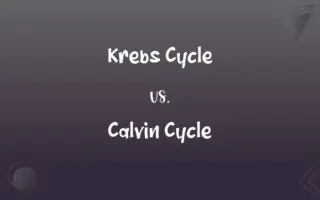Force vs. Power: What's the Difference?
Edited by Aimie Carlson || By Janet White || Published on January 23, 2024
Force is the physical interaction that changes an object's motion, while power is the rate at which work is done or energy is transferred.

Key Differences
Force is a physical interaction that can cause an object to move, stop, or change direction, exemplified by pushing or pulling. Power is the rate at which work is performed or energy is consumed, measured in watts, highlighting efficiency and speed.
Force is measured in newtons and directly affects an object's acceleration and mass. Power, measured in watts, indicates how quickly work is done, emphasizing the speed of energy transfer.
Force can be static, like the weight of an object on a surface, or dynamic, like a moving car. Power is dynamic, representing ongoing energy usage, such as electricity powering a lightbulb.
In physics, force is described by Newton's laws, which explain how forces cause motion. Power is more about the efficiency of energy usage, such as how fast a car engine converts fuel into movement.
Force can be gravitational, electromagnetic, or applied, influencing an object's state of motion. Power is often associated with machines, engines, and electrical systems, quantifying how rapidly they perform work or consume energy.
ADVERTISEMENT
Comparison Chart
Definition
Physical interaction causing motion
Rate of doing work or transferring energy
Measurement
Newtons
Watts
Key Characteristics
Causes acceleration, can be static or dynamic
Indicates efficiency, speed of energy transfer
Application
Affects objects' motion
Reflects energy usage in systems
Physics Principle
Newton's laws of motion
Work-energy principle
ADVERTISEMENT
Force and Power Definitions
Force
Force can also mean strength or energy as an attribute of physical action.
She used all her force to lift the heavy box.
Power
Power refers to the rate at which work is done or energy is transferred.
The power output of the engine is measured in horsepower.
Force
Force is a push or pull upon an object resulting from its interaction with another object.
Applying force, he pushed the stalled car to the side of the road.
Power
Power can also mean electrical or mechanical energy, especially as supplied to households and industries.
The city experienced a power outage last night.
Force
Force is the influence that produces a change in a physical quantity.
The force of the wind caused the tree to sway.
Power
Power is the ability or capacity to do something or act in a particular way.
The power of the speech moved the audience.
Force
Force is the cause of acceleration or the change in an object's velocity.
The car's acceleration was due to the force applied by the engine.
Power
Power is the capacity or ability to direct or influence the behavior of others or a course of events.
The president holds significant power over the country’s policies.
Force
Force in physics refers to an influence that changes the motion of an object.
Gravity is a force that pulls objects towards the earth.
Power
Power in physics means the rate of doing work, equivalent to an amount of energy consumed per unit time.
This electrical appliance has a high power consumption.
Force
The capacity to do work or cause physical change; energy, strength, or active power
The force of an explosion.
Power
The ability or capacity to act or do something effectively
Is it in your power to undo this injustice?.
Force
Power made operative against resistance; exertion
Use force in driving a nail.
Power
Often powers A specific capacity, faculty, or aptitude
Her powers of concentration.
FAQs
Can force exist without motion?
Yes, force can exist as a static force without causing motion.
How is power defined in physics?
In physics, power is the rate at which work is done or energy is transferred.
Can the same force produce different effects?
Yes, depending on the context, the same force can produce different effects.
What is an example of power in daily life?
An example is the electrical power used to run household appliances.
What factors affect power in a machine?
Factors include the machine's efficiency and the rate of energy conversion.
Can power be conserved?
Power itself is not conserved, but the energy it represents can be.
What is the basic definition of force?
Force is a push or pull exerted on an object to change its motion.
Is force always visible?
Not always; some forces, like gravity, are not visible but can be observed through their effects.
Is force a vector quantity?
Yes, force is a vector quantity as it has both magnitude and direction.
Does higher power always mean better performance?
Not necessarily; it depends on the efficiency and purpose of the system.
Is power a scalar or a vector quantity?
Power is a scalar quantity as it has magnitude but no direction.
What is an example of a non-contact force?
Magnetic force is an example of a non-contact force.
How is electrical power calculated?
Electrical power is calculated as the product of voltage and current.
How does power relate to energy?
Power is a measure of how quickly energy is used or transferred.
How do mass and force relate?
Force is the product of mass and acceleration, according to Newton's second law.
Can force be exerted without contact?
Yes, forces like gravity and magnetism act at a distance.
What unit is power measured in?
Power is commonly measured in watts.
Do all forces cause motion?
Not always; some forces may be balanced, resulting in no motion.
Is gravitational force always attractive?
Yes, gravitational force is always attractive, pulling objects together.
Does higher power mean faster work?
Generally, higher power can mean faster work, but it also depends on the system's efficiency.
About Author
Written by
Janet WhiteJanet White has been an esteemed writer and blogger for Difference Wiki. Holding a Master's degree in Science and Medical Journalism from the prestigious Boston University, she has consistently demonstrated her expertise and passion for her field. When she's not immersed in her work, Janet relishes her time exercising, delving into a good book, and cherishing moments with friends and family.
Edited by
Aimie CarlsonAimie Carlson, holding a master's degree in English literature, is a fervent English language enthusiast. She lends her writing talents to Difference Wiki, a prominent website that specializes in comparisons, offering readers insightful analyses that both captivate and inform.































































